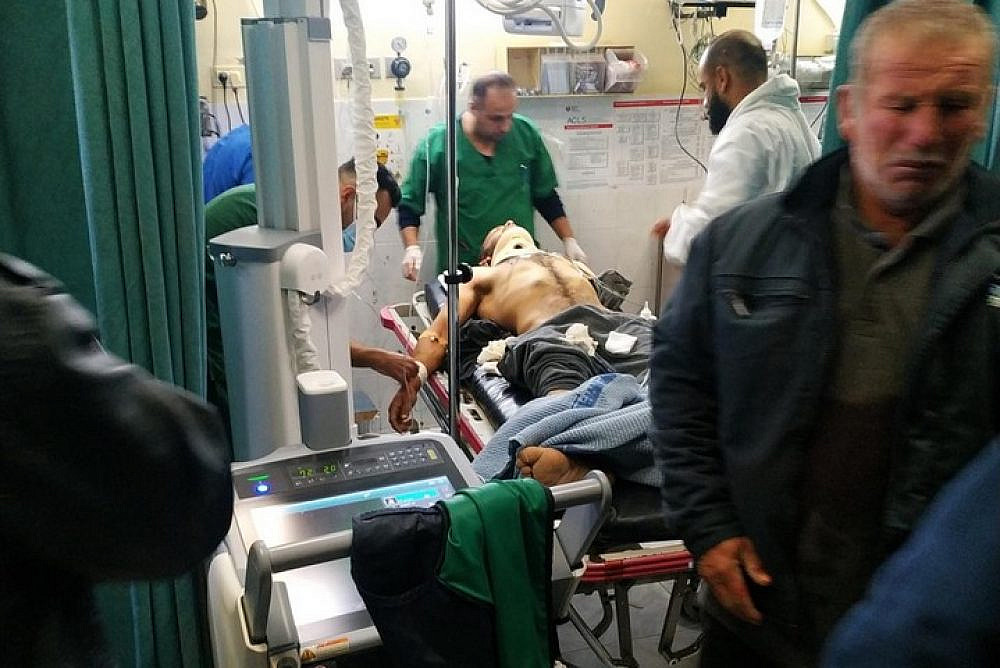On Friday afternoon, an Israeli soldier shot a 26-year-old Palestinian named Harun Abu Aram in the neck from point blank range. Abu Aram is now in critical condition in a hospital in Hebron in the occupied West Bank. According to the Palestinian Health Ministry, should he be responsive, Abu Aram will likely be paralyzed.
The shooting took place near the Palestinian village of al-Rakiz in the South Hebron Hills. Just a month ago, the army came with bulldozers to demolish four homes in the community; Abu Aram’s was one of those homes.
Contrary to the Israeli army’s claims, the residents of al-Rakiz are no criminals. They built their homes on their land in accordance with the law. The army destroyed them because the Civil Administration — the arm of Israel’s military government that runs the day-to-day life of 2.8 million Palestinians in the West Bank — refuses to issue building permits to the community. In fact, the Civil Administration rejects 98.7 percent of requests for building permits by Palestinians living in the 164 villages in Area C — an area that makes up two thirds of the West Bank and is under full Israeli military and administrative control.
The point of this bureaucratic obstinance is to immiserate the lives of Palestinians to the point that they leave. Why? Because if they leave, it will be easier for Israel to annex the land in the future without having to grant anyone Israeli citizenship. A simple demographic calculation.
The Civil Administration rejects the notion that this is privately-owned Palestinian land, and thus prevents them from obtaining building permits and master plans. The Administration knows that the destruction of homes and infrastructure will make the lives of the local population miserable, and in time, will compel them to abandon their land.
WATCH: Israeli soldier shoots Harun Abu Aram in the neck
Abu Aram arrived on Friday morning to help rebuild one of the homes that had been demolished. After a few hours of working in the sun, a Civil Administration vehicle carrying five Israeli soldiers arrived. The soldiers told Abu Aram and his friends that they could not build there. Then they wandered over to his generator, which he was using for construction, and confiscated it. Such confiscations are yet another method of coercing Palestinians in Area C off their land, with the army regularly taking away water tanks, construction tools, tractors, and tin huts.
When the soldier started dragging the generator, Abu Aram resisted. He began screaming, while his closest friends tried to get him to calm down. But he screamed. A month ago, his house was demolished. A month ago, his little sister and mother were subjected to unimaginable trauma. I was there. Now they had come to take his generator. And so, he screamed and resisted.
Abu Aram tried to grab the generator back by force, cursing the soldiers. For a moment he even succeeded. But then it was the soldiers’ turn to fight back.
Shoving began, and then suddenly, a gunshot rang out. The soldiers did not throw a stun grenade or fire tear gas. No, they shot an unarmed man — whose home was demolished a month ago, whose sister and mother were forced to sleep outdoors — in the neck with live ammunition from point-blank range. Over a generator.
A video of the shooting quickly went viral on social media. The gunshot can be heard in the video. Then we see Abu Aram bleeding. Then we hear his mother’s screams.
Following the shooting, the IDF Spokesperson’s Unit issued the following statement: “During a routine assignment by the IDF and Border Police forces of confiscating and evacuating an illegal structure in the village of a-Tuwani, there developed a violent disturbance of about 150 Palestinians that included massive stone-throwing. IDF soldiers responded using riot control measures and firing into the air. During the disturbances, a violent incident occurred in which several Palestinians used violence against the [army] force.”
This statement is a blatant lie. One can see it in the video. There is one family there — about 10 people in total. Witnesses say that there were no stones and nowhere near 150 people.
In the coming days, the Israeli army may announce that they have “launched an investigation into the incident.” They almost always do — but almost nothing ever comes out of it. On very rare occasions, they might even announce that a soldier opened fire “in contravention to regulations.” Maybe, because Abu Aram’s shooting was caught on tape, they’ll use this excuse again.
But that is beside the point. The overarching policy is one that begets the behavior of that soldier in al-Rakiz. A policy motivated by demographics that prevents thousands of Palestinians in Area C from building on their land. That prevents Palestinians from living. That seeks to make them disappear. It’s not easy to write, but it is true. Usually when the soldiers come, it ends with stolen belongings or a destroyed home. This time, it ended with a bullet in the neck.
A version of this article first appeared in Hebrew on Local Call. Read it here.


